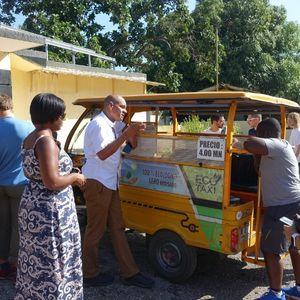Over Thanksgiving week, Kevin Jones, director of the Institute for the Energy and the Environment (IEE) and Professor of Energy Law and Policy, and Jill Martin Diaz, assistant professor and lead attorney of Vermont Immigrant Assistance at Vermont Law and Graduate School (VLGS), traveled to Cuba with 13 students from the Global Sustainability Field Studies course. This is a rich experiential environment for the students to learn about sustainable energy and agriculture in both urban and rural areas on this unique island nation.
During the week, the students learned about Cuban energy and agriculture sustainability, climate change, and the impacts of the U.S. embargo from faculty at the University of Havana, the Technological University of Havana, Cuban ministries, and the non-profit organization, Cubasolar. Later in the week, the students toured agricultural cooperatives, sustainable farms, and clean energy projects such as electric taxi services.

Unión Eléctrica, Cuba’s Electric Utility, shows off its clean transportation pilot program that is electrifying these three-wheeler taxis and offering opportunities for women to become taxi drivers.
“I didn’t know what to expect when going on the Cuba trip, but it was easily one of the most meaningful experiences during my time at VLGS. Academically and personally, it exposed me to ideas that I don’t think I would have been able to explore in a traditional classroom setting. Life changing sounds cliche, but it definitely has had a lasting impact on me and my career,” Isabella Montoya, JD and Master of Energy Regulation and Law ’23.

Isabella Montoya enjoying Finca Vista Hermosa, Cuba
“It’s uplifting to experience the generosity and warmth of the Cuban people toward our faculty and students,” said Professor Jones. “From Day One, professors, farmers, Cuban entrepreneurs, and our local travel partners have embraced us and openly contributed to our learning about sustainability and climate change in Cuba.”
The eight-day trip is offered by the IEE, which has spent years building connections with Cuban academics and advocates focused on sustainability, and is part of VLGS’s Tuholske Institute for Environmental Field Studies .
The institute is committed to preparing students to advance sustainability and justice through place-based experiential education opportunities. “Field studies give students the chance to see the complexity of environmental issues on the ground, hear from the communities most affected, and understand the urgency of the challenges ahead. The Tuholske Institute strengthens these experiences for our students,” said Professor Jennifer Rushlow, dean of the Vermont School for the Environment at VLGS.
An integral part of the master’s, LLM, and joint degree programs is gaining real-world experience through externships, clinics, and field courses. VLGS is known for its experiential learning and students come to the school because it offers more diverse environmental options than most schools in the country.